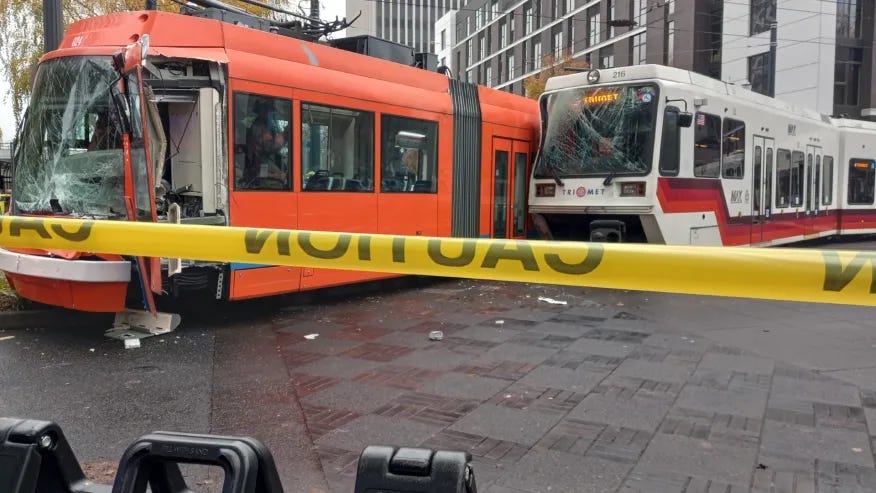Which way, Oregon Democrats?
Measure 110 is destroying the most recognized symbols of Oregon liberalism.

Oregon spent decades experimenting with liberal projects, like light rail transit and the bottle and can deposit law known as the bottle bill, that earned it a global reputation for feel-good leftism. The resulting brand is so powerful that many outsiders assume an Oregonian, just by virtue of living in the state, recycles with a vengeance, rides transit and probably likes a little goat yoga on the way home from work at the local grocery co-op.
What Oregon liberalism built over decades, hard drug decriminalization is destroying in the relative blink of an eye. Since the decriminalization law approved by voters in the form of Ballot Measure 110 went into effect only three years ago, the direct and indirect consequences of rampant drug use have mounted.
Decriminalized drugs are killing Oregonians at a rapidly increasing clip. Oregon saw a 1,500% increase in fentanyl overdose deaths since 2019, the biggest jump over that time period in the country. Oregon led the country in the rate of increase of fentanyl overdose deaths from 2022 - 2023. Open use of hard drugs now defines parts of downtown Portland, and overdoses claim the lives of Oregonians of all ages, even toddlers.
The Measure 110 bitter-enders, fueled by funding from pro-legalization, New York-based Drug Policy Alliance, argue, implausibly, that Measure 110 is not to blame for any portion of Oregon’s burgeoning drug crisis.
Partnership for Safety and Justice, one of the Drug Policy Alliance-funded nonprofits spearheading the defense of Measure 110 claimed on Twitter/X today that Measure 110 is “a solution to Oregon’s crisis,” referring to the state’s drug crisis. Oregonians, who have watched drugs hollow out their state, their streets, their families and their friends at an increasing rate since Measure 110’s enactment, just aren’t going to buy that.
Measure 110 decriminalized the hard drugs that are killing so many Oregonians, but its effect is even broader. Most people who use hard drugs don’t overdose and die. But many ride Portland’s MAX light rail. A September 2023 study by researchers at the University of Washington found that 98% of MAX surfaces and 100% of MAX air samples contained methamphetamine, the possession of which was decriminalized by Measure 110.
The news that meth residue is common on the MAX was as unsurprising as it was poorly timed. Portland’s transit provider, Tri-Met, which operates MAX, reports that ridership has struggled to recover since COVID nearly shuttered the system in 2020. Weekly ridership for the system is still down 33% compared to pre-pandemic levels. Riding MAX to demonstrate one’s environmental bona fides is one thing; sharing the ride with methamphetamine is quite another.
Before Measure 110 came along, the bottle bill was Oregon’s most famous law. Signed into law in 1971 by liberal Republican Governor Tom McCall, the bottle bill made Oregon the first state in the nation to confiscate a nickel (now a dime) from beverage purchasers to be returned to them only upon their return of the empty container to a designated recycling spot.
Collecting and returning cans for cash has long been a vocation favored by homeless people in Oregon. The drug crisis has spurred a veritable can rush in the state, as addicts cobble together enough cans to buy fentanyl. The going rate is 50 cans for a day’s worth of fentanyl, according to Willamette Week’s Nigel Jaquiss. Also from Jaquiss:
At a gathering of business leaders last year, then-Portland Police Chief Chuck Lovell told the group that the cans-for-fentanyl exchange was so routine that some dealers were even accepting cans instead of cash.
The return of all that aluminum and glass currency has turned Oregon’s bottle return locations into places frequented by addicts and dealers, and often avoided by the remainder of the public. Anecdotally, I have had no fewer than three conversations with fellow Bendites in the past week about their refusal to take cans to the return spot here, which is the fenced-off epicenter of the city’s most persistent homeless encampment.
Oregon legislative Democrats are right now deciding whether, and how, to recriminalize hard drugs in Oregon. Their Democrat-registered constituents - the biggest concern in a state dominated by Democrats since the days of Tom McCall - are divided. Hence Democrats’ attempt recriminalize, but just barely, hard drug possession.
Polls show most Democrats in the state want to repeal Measure 110. As well they should. Besides the surging overdose deaths, decriminalized hard drugs erode the hallowed bastions of Oregon liberalism.
Hard drugs and those tragically addicted to them are kryptonite for a voting bloc that has long urged people to commute and recycle together and to live nearby each other in city centers.
The smaller contingent of Oregon Democrats, led by well-funded nonprofits bearing Orwellian names interchangeably incorporating words like “safety” and “justice,” cannot admit, for ideological or financial reasons, that Measure 110 is a failure.
Even as that failure gnaws at the best-known monuments of Oregon liberalism.
Which way, Oregon Democrats?




A succinct account of how we got ourselves into this crisis, and how we’re probably not going to make the tough decisions to get ourselves out. A tragedy. Great work, Jeff.
That's how we solve our problems in Oregon. Create a crisis. Screw things up with a "fix."
Not to worry. The eggs we now buy at the grocery store are from cage free chickens. So, apparently it's better for poor folks to pay about $4.50 a dozen instead of a pre-pandemic-lockdown price of about $1.69. Time for a new subsidy.